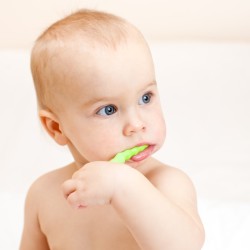Good Dental Health Starts Early


Active participation from the care giver is needed. As soon as teeth erupt, keeping them clean is important. At the age of 12 months, a child should see the dentist to make sure there are no underlying problems with their oral health. This is a perfect opportunity to ask questions and learn how to care for the child’s teeth until they are old enough to brush and floss on their own.
In addition to efforts to keep plaque from forming on the child’s teeth, there are other actions that can be taken:
- Monitor snacks and limit sugary beverages. Although these are baby teeth that will eventually be replaced by permanent teeth, they can suffer decay that must be repaired.
- Never put a child down for bedtime or a nap with a baby bottle containing anything but water. If a child falls asleep with a beverage containing sugar like juice, formula, or milk the residual that may remain in the child’s mouth sits on the teeth. The sugars form bacteria that can result in plaque build-up that can damage the child’s teeth.
- Discourage the use of a pacifier or finger/thumb sucking after the age of three years. Extensive reliance on a pacifier or allowing thumb sucking can result in a dental malocclusion that can mean years of eventual orthodontic care.
- Teach children very early how to brush correctly. Use an age appropriate tooth paste or gel. This is a perfect way to demonstrate how children can learn through example … allow your child to watch you brush and floss daily.
- Early visits to the dental office will familiarize the child to what happens during the dental visit. Waiting until a dental problem is evident can create trauma for future visits.
The payoff will be healthy teeth and gums for your child that will carry over into a lifetime of excellent dental health.
Contact Howl Dental at 918-749-1626 for more information and to schedule your child’s appointment today.